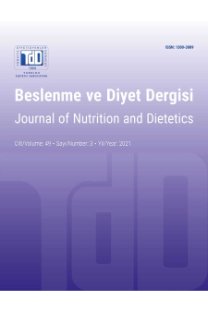İrritabl Bağırsak Sendromunda (İBS) FODMAP Diyetinin İBS Semptomları, Beslenme Durumu ve Yaşam Kalitesi Üzerine Etkilerinin Değerlendirilmesi
Evaluation of the Effects of FODMAP Diet on Irritable Bowel Syndrome Symptoms, Nutritional Status and Quality of Life
___
- 1. Güray Can BY. İrritabl barsak sendromunun tanı ve tedavisinde yaklaşımlar. Güncel Gastroentroloji. 2015;19(3):172-81.
- 2. Lovell RM, Ford AC. Global prevalence of and risk factors for irritable bowel syndrome: a meta-analysis. Clin Gastroenterol Hepatol. 2012;10(7):712-21.
- 3. Özden A, Köksal AŞ, Oğuz D, Çiçek B, Yilmaz U, Dağli Ü, ve ark. Türkiye’de birinci basamak sağlık kurumlarında irritabl barsak sendromu görülme sıklığı. Akademik Gastroenteroloji Dergisi. 2006;5(1):4-15
- 4. Kasap E, Semiz HS, Gerçeker E, Yüceyar H. İrritabl barsak sendromu ve kolonoskopi. Endoskopi Gastrointestinal. 2011;19(2):43-6.
- 5. Schmulson MJ, Drossman DA. What is new in Rome IV. J Neurogastroentrol Motil. 2017;23(2):151-63.
- 6. Soares RL. Irritable bowel syndrome: a clinical review. World J Gastroenterol. 2014;20(34):12144-60.
- 7. Thomas A, Quigley EM. Diet and irritable bowel syndrome. Curr Opinion Gastroenterol. 2015;31(2):166- 71.
- 8. Simren M, Mansson A, Langkilde AM, Svedlund J, Abrahamsson H, Bengtsson U, et al. Food-related gastrointestinal symptoms in the irritable bowel syndrome. Digestion. 2001;63(2):108-15.
- 9. Cuomo R, Andreozzi P, Zito FP, Passananti V, De Carlo G, Sarnelli G. Irritable bowel syndrome and food interaction. World J Gastroenterol. 2014;20(27):8837-45.
- 10. Barrett JS, Gibson PR. Clinical ramifications of malabsorption of fructose and other short-chain carbohydrates. Practical Gastroenterology. 2007;31(8):51-65.
- 11. Barrett JS. Extending our knowledge of fermentable, short-chain carbohydrates for managing gastrointestinal symptoms. Nutr Clin Pract.2013;28(3):300-6.
- 12. Nanayakkara WS, Skidmore PM, O’Brien L, Wilkinson TJ, Gearry RB. Efficacy of the low FODMAP diet for treating irritable bowel syndrome: the evidence to date. Clin Exp Gastroenterol. 2016;9:131-42.
- 13. Gibson PR. Food intolerance in functional bowel disorders. J Gastroenterol Hepatol. 2011;26(3):128-31.
- 14. Spencer M, Chey WD, Eswaran S. Dietary renaissance in IBS: has food replaced medications as a primary treatment strategy? Curr Treat Options Gastroenterol. 2014;12(4):424-40.
- 15. Eswaran S, Farida JP, Green J, Miller JD, Chey WD. Nutrition in the management of gastrointestinal diseases and disorders: The evidence for the low fodmap diet. Curr Opin Pharmacol 2017;37:151-7.
- 16. Shepherd SJ, Gibson PR. Fructose malabsorption and symptoms of irritable bowel syndrome: guidelines for effective dietary management. J Am Diet Assoc. 2006;106(10):1631-9.
- 17. Staudacher HM, Whelan K, Irving PM, Lomer MC. Comparison of symptom response following advice for a diet low in fermentable carbohydrates (FODMAPs) versus standard dietary advice in patients with irritable bowel syndrome. J Hum Nutr Diet. 2011;24(5):487-95.
- 18. Francis CY, Morris J, Whorwell PJ. The irritable bowel severity scoring system: a simple method of monitoring irritable bowel syndrome and its progress. Aliment Pharmacol Ther. 1997;11(2):395-402.
- 19. Patrick DL, Drossman DA, Frederick IO, DiCesare J, Puder KL. Quality of life in persons with irritable bowel syndrome: development and validation of a new measure. Dig Dis Sci. 1998;43:400-11.
- 20. Uran B, Karadakovan A, Vardar R, Bor S. Psychometric properties of the Irritable Bowel Syndrome Quality of Life Scale in Turkey. J Hepatol Gastroint Dis. 2016;2(3):1- 7.
- 21. Zigmond AS, Snaith PR. The Hospital Anxiety and Depresion Scale. Acta Psychiatr Scand.1983;67:361-70.
- 22. Aydemir Ö. Hastane Anksiyete ve Depresyon Ölçeği Türkçe Formunun Geçerlilik ve Güvenilirlik Çalısması. Türk Psikiyatri Dergisi. 1997;8(4):49-59.
- 23. Yilmaz S, Dursun M, Ertem M, Canoruc F, Turhanoglu A. The epidemiological aspects of irritable bowel syndrome in Southeastern Anatolia: a stratified randomised community-based study. Int J Clin Pract. 2005;59(3):361- 9.
- 24. Celebi S, Acik Y, Deveci SE, Bahcecioglu IH, Ayar A, Demir A, et al. Epidemiological features of irritable bowel syndrome in a Turkish urban society. J Gastroenterol Hepatol. 2004;19(7):738-43.
- 25. Bohn L, Storsrud S, Liljebo T, Collin L, Lindfors P, Tornblom H, et al. Diet low in FODMAPs reduces symptoms of irritable bowel syndrome as well as traditional dietary advice: a randomized controlled trial. Gastroenterology. 2015;149(6):1399-407.
- 26. Eswaran S, Dolan RD, Ball SC, Jackson K, Chey W. The Impact of a 4-week low-FODMAP and mNICE Diet on nutrient intake in a sample of US adults with irritable bowel syndrome with diarrhea. J Acad Nutr Diet. 2019; pii:S2212-2672(18) 31544-2
- 27. Erdinç AŞ. Konstipasyon baskın İrritabl Bağırsak Sendromu olan hastaların semptomatik tedavisinde farklı diyet türlerinin etkisi [Bilim Uzmanlığı Tezi]. Hacettepe Üniversitesi/Sağlık Bilimleri Enstitüsü, Ankara; 2018.
- 28. Halmos EP, Power VA, Shepherd SJ, Gibson PR, Muir JG. A diet low in FODMAPs reduces symptoms of irritable bowel syndrome. Gastroenterology. 2014;146(1):67-75.
- 29. Staudacher HM. Nutritional, microbiological and psychosocial implications of the low FODMAP diet. J Gastroenterol Hepatol. 2017;32(1):16-9.
- 30. McIntosh K, Reed DE, Schneider T, Dang F, Keshteli AH, De Palma G, et al. FODMAPs alter symptoms and the metabolome of patients with IBS: a randomised controlled trial. Gut. 2017;66(7):1241-51.
- 31. Pedersen N, Andersen NN, Végh Z, Jensen L, Ankersen DV, Felding M, et al. Ehealth: low FODMAP diet vs Lactobacillus rhamnosus GG in irritable bowel syndrome. World J Gastroenterol. 2014;20(43):16215-26.
- 32. Michalsen VL, Vandvik PO, Farup PG. Predictors of health-related quality of life in patients with irritable bowel syndrome. A cross-sectional study in Norway. Health Qual Life Outcomes. 2015;13(1):113-22.
- ISSN: 1300-3089
- Yayın Aralığı: Yılda 3 Sayı
- Başlangıç: 1972
- Yayıncı: Türkiye Diyestisyenler Derneği
Zeynep CAFEROĞLU, Gizem AYTEKİN ŞAHİN, Nihal HATİPOĞLU, Neriman İNANÇ
Can YALÇIN, SEZEN YILMAZ SARIALTIN, Mahmoud ABUDAYYAK, Engin YENİLMEZ
Sezen YILMAZ SARIALTIN, Mahmoud ABUDAYYAK, Engin YENİLMEZ, Can Özgür YALÇIN
Romatoid Artritli Kadın Hastalarda Beslenme Durumunun Değerlendirilmesi
Hülya OĞUR, Rezzan GÜNAYDIN, Neslişah RAKICIOĞLU
Tuba USTAOĞLU, Nilüfer TEK, Abdullah Emre YILDIRIM
Yeni Koronavirüs (SARS-CoV-2/COVID-19) Pandemisi Sırasında Beslenme Tedavisi ve Önemi
Mücahit MUSLU, Dilek ÖZÖELİK ERSÜ
Kistik Fibrozis ile İlişkili Diyabet: Bir Olgu Sunumu
Rukiye BOZBULUT, Esra DÖĞER, Tuğba ŞİŞMANLAR EYÜBOĞLU, Zekiye KÜPÇÜ, Aysun BİDECİ, Orhun ÇAMURDAN, Peyami CİNAZ, AYŞE TANA ASLAN
Diyet Posasının ve Bağırsak Mikrobiyotasının Kolon Kanseri Riskine Etkileri
